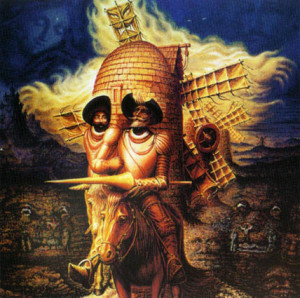Wahooo!!! We finished the first part of Don Quixote! Thank goodness and badness. Unfortunately the book club did not meet… What can I say we’re busy people. However, we will meet tomorrow, covering the first hundred pages of the new part, and I will recount, relay, review these last 50 pages.
This post is going to be quick because we did not meet to discuss it. If you’d like to see more in depth and analytical post please refer to a number of the previous posts.
I have to say that the ending of the first part of this great book was lackluster. Nothing particularly special happens to our knight or his loyal squire. At least, nothing too revealing or new happens; it ends the way it began with a bunch of sonnets. It’s too bad I never developed a love for poetry.
Now remember that the book was first published in two parts. The first in 1605 and the second part in 1615. And there was a false second part published by someone else, of which Cervantes addresses in the beginning of the Second Part (but that’s for the next post). As for beginning’s end, I find it hard to think of material to talk about.
Although, when I find myself hitting a wall in thought, I always go right to the beginning. I write it out… This reading starts with Chapter XLVIII, in which the canon continues to discuss of chivalry, as well as other matters worthy of his ingenuity. Then the next chapter… XLIX, which recounts the clever conversation that Sancho Panza had with his master, Don Quixote.
The following chapter headings for this reading are:
L: Regarding the astute arguments that Don Quixote had with the canon as as other matters.
LI: Which recounts what the goatherd told to all those who were taking Don Quixote home.
LII: Regarding the quarrel that Don Quixote had with the goatherd, as well as the strange adventure of the penitents, which he brought to a successful conclusion by the sweat of his brow.
Now I know we haven’t gone over the chapter headings in this here blog before, and these seem to be more tame than the others. Some, later on in the book, simply say, ‘in which interesting and notable stuff is recounted.’ All of us in the book club have touched upon the seemingly useless headings that simply state what could have been expected. And even if something surprising comes up, the chapter headings don’t adequately warn us from that surprising thing, which is usually Don Quixote being beaten and Sancho thrown up in a blanket. We just find it curious is all.
There are a few things that are interesting and worth touching on before we move on to the better half of this novel.
This book is undoubtedly about books. The first novel being about something very old is rather novel, wouldn’t you think? But in Quixote’s defense of the novels of chivalry he touches on a very important point. On page 428, he remarks how literature, or plays, can influence, delight, and teach all classes of people. He basically says that literature is a force that can level the playing field of classism. When there’s a play being acted or a book being read, it doesn’t matter who you are as long as you are deriving pleasure from the art. And that can be anyone, at least according to Don Quixote.
Next, ten pages later, Quixote uses a story of a knight facing this lake of muck as an example of a liminal space where the knight throws himself in a bubbling swamp with snakes and other hideous things and finds himself in a kingdom with the most beautiful damsel’s ever seen. Here we are reminded of how courage can reward, however this meaning or message is carried through Quixote’s lips from a fictional book he read. This in the fictional realm of Cervantes did not happen in the reality of Don Quixote, rather the knight fell into the lake within Quixote’s fictional realm.
Then, almost to the end of the first part a goatherd recounts his story and why he is left wandering the forest. And, his story sounds a lot like that of Marcella’s. You remember the daughter of someone who chose to not like anyone. We met her a while ago more towards the beginning of the book. Nevertheless the woman in the goatherd’s story sounded rather mean, ruthless even. My question here to Cervantes, is are we supposed to see a redundancy in life, narrative? Who knows.
All I know in the whole wide world right now is that I’m happy to be moving on to the other side of this book. Which, I can tell, is already better. For it truly brings life into the mix…
The Writing Lab
